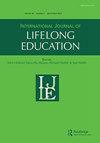Task-related competencies: knowledge, skills, and abilities of the helping professionals
IF 1.9
Q2 EDUCATION & EDUCATIONAL RESEARCH
引用次数: 0
Abstract
ABSTRACTThe role of competencies in lifelong education is of great interest across helping professions. However, no known empirical research has focused on exploring the relationship between competencies and job tasks within the context of helping professions. This study sought to establish the competencies (i.e. knowledge, skills, and abilities) that the helping professionals use to perform their jobs. This research utilised an exploratory sequential mixed methods design. In the qualitative phase, focus group interviews were carried out with subject-matter experts to explore the tasks and competencies of helping professionals. Then, building on the findings, an inventory of the tasks and competencies of helping professionals was formed. In the quantitative phase, 819 helping professionals were asked to rate each of the items in this inventory. The results of the exploratory factor analyses yielded a multidimensional structure for both the competencies and tasks. Next, multiple linear regression analyses revealed that different categories of competencies were associated with different task domains. The findings can contribute to a better understanding of lifelong learning within helping professions.KEYWORDS: helping professionalscompetenciesjob functions Disclosure statementNo potential conflict of interest was reported by the author(s).Supplemental dataSupplemental data for this article can be accessed online at https://doi.org/10.1080/02601370.2023.2262149与任务相关的能力:帮助专业人员的知识、技能和能力
摘要胜任力在终身教育中的作用一直是帮助专业关注的焦点。然而,目前还没有实证研究集中在探究能力和工作任务之间的关系。这项研究试图建立胜任力(即知识、技能和能力),帮助专业人员使用他们的工作。本研究采用探索性顺序混合方法设计。在定性阶段,与主题专家进行焦点小组访谈,以探讨帮助专业人员的任务和能力。然后,在调查结果的基础上,形成了一份帮助专业人员的任务和能力清单。在定量阶段,819名专业帮助人员被要求对清单中的每个项目进行评分。探索性因素分析的结果产生了能力和任务的多维结构。其次,多元线性回归分析显示,不同类别的胜任力与不同的任务域相关。这些发现有助于更好地理解帮助行业中的终身学习。关键词:帮助专业人员能力工作职能披露声明作者未报告潜在的利益冲突。补充数据本文的补充数据可以在线访问https://doi.org/10.1080/02601370.2023.2262149
本文章由计算机程序翻译,如有差异,请以英文原文为准。
求助全文
约1分钟内获得全文
求助全文
来源期刊

International Journal of Lifelong Education
EDUCATION & EDUCATIONAL RESEARCH-
CiteScore
3.10
自引率
27.80%
发文量
40
期刊介绍:
The International Journal of Lifelong Education provides a forum for debate on the principles and practice of lifelong, adult, continuing, recurrent and initial education and learning, whether in formal, institutional or informal settings. Common themes include social purpose in lifelong education, and sociological, policy and political studies of lifelong education. The journal recognises that research into lifelong learning needs to focus on the relationships between schooling, later learning, active citizenship and personal fulfilment, as well as the relationship between schooling, employability and economic development.
 求助内容:
求助内容: 应助结果提醒方式:
应助结果提醒方式:


